
Line A is the oldest line of the Buenos Aires Underground. Opened to the public on 1 December 1913, it was the first underground line in South America, the Southern Hemisphere and the Spanish-speaking world. It made Buenos Aires the 13th city in the world to have an underground transport service. The line stretches 9.8 km (6.1 mi) from Plaza de Mayo and San Pedrito and runs under the full length of the Avenida de Mayo and part of the Avenida Rivadavia, and is used by 258,000 people per day.

Constitución railway station is a large railway station in Constitución, a barrio in central Buenos Aires, Argentina. The full official name of the station is Estación Plaza Constitution reflecting the fact that the station is located opposite Constitution Square, two kilometers to the south of the Obelisco landmark. The ground floor of the station has fourteen tracks and the floor below has two tracks for the Buenos Aires Underground.

July 9 Avenue is a major thoroughfare in the city centre of Buenos Aires, Argentina. Its name honors Argentina's Independence Day, July 9, 1816.

Liniers is a barrio (neighborhood) of Buenos Aires on the edge of the city, centered on Rivadavia Avenue. It is also an important train station and bus hub, connecting western Gran Buenos Aires with the Buenos Aires Metro.

Caballito is a barrio (neighborhood) of the Argentine capital, Buenos Aires. It is the only barrio in the administrative division Comuna 6.

Villa Devoto is a neighborhood or district located in the northwestern area of the city of Buenos Aires, Argentina. Its administrative limits are defined by Lope de Vega, General Paz, San Martín, and Francisco Beiró Avenues; and Joaquín V. González, Baigorría, and Campana streets.
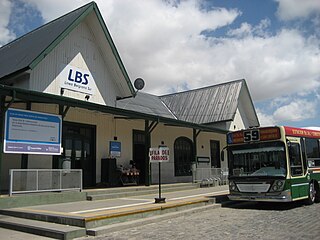
Buenos Aires is a former passenger railway station in the city of Buenos Aires, Argentina. The station was terminus of the Belgrano Sur line that runs trains along Greater Buenos Aires region.

Federico Lacroze railway station is a passenger railway station in Buenos Aires, Argentina. The station is located in the city's outlying barrio (neighbourhood) of Chacarita in a predominantly residential area. It is just a short distance north of the Cementerio de la Chacarita, the city's largest cemetery. The station is named after Federico Lacroze, a prominent 19th century Argentine railway and transport pioneer who obtained the concession for building the Buenos Aires Central Railway in 1884. When the Argentine railway network was nationalised in 1948 the station became the Buenos Aires terminus for the lines that became part of the General Urquiza Railway (FCGU).

Parque Patricios is a barrio located on the southern side of Buenos Aires, Argentina belonging to the fourth comuna.
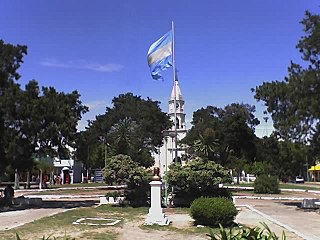
Merlo is the head city of the eponymous partido of Merlo and seat of the municipal government, located in the Greater Buenos Aires urban area of Buenos Aires Province, Argentina.

Plaza de la República is a city square in Buenos Aires, capital of Argentina. It is located in the San Nicolás quarter, at the intersection of the city's three main arteries: Ninth of July Avenue, Corrientes Avenue, and Diagonal Norte. It derives its name and associations from a church once sited on the square, San Nicolás de Bari, where the country's national flag was hoisted for the first time.
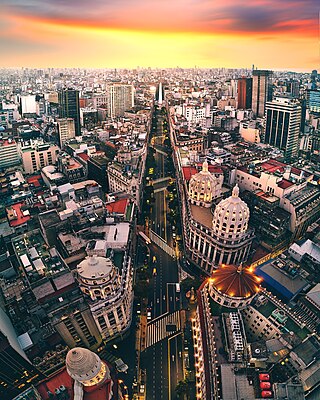
Avenida Roque Sáenz Peña, better known as Diagonal Norte, is an important avenue in the San Nicolás neighborhood of Buenos Aires, Argentina. It is oriented south-east/north-west, diagonally bisecting the city blocks (manzanas) which give the city centre a checkerboard plan. It is named after President Roque Sáenz Peña, who held power from 1910 to 1914 and passed the law which established universal suffrage, secret ballot and an electoral register.

Avenida Santa Fe is one of the principal thoroughfares in Buenos Aires, Argentina. The artery is essential to the imaginary axis of Barrio Norte in Buenos Aires, comprising the areas influenced by the route of the avenue through Retiro, Recoleta and Palermo neighborhoods, it is considered one of the main shopping and strolling areas of the city, its many boutiques range from elegant to edgy, which has led it to be dubbed the 'Avenue of Fashion'. Upscale Alto Palermo, at Avenida Coronel Díaz, is one of the city's best-known vertical malls. Avenida Santa Fe is also an attraction for its architecture, strongly reminiscent of Paris. Its name pays homage to the eponymous province in Argentina.

Retiro bus station is the main bus terminal in Buenos Aires, Argentina. It is situated in the Retiro district, two blocks north of Retiro railway station.

Agüero Street is an artery road of the City of Buenos Aires and crosses the neighborhoods of Recoleta and Balvanera.
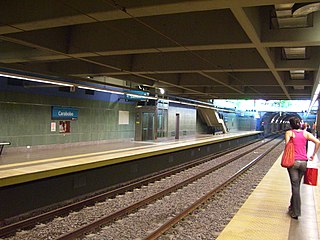
Carabobo is a station on Line A of the Buenos Aires Underground. It is located at the 6300 block of Rivadavia avenue. It is near the Koreatown of Buenos Aires. The station was opened on 23 December 2008 as the western terminus of the extension of the line from Primera Junta. On 27 September 2013 the line was extended to San Pedrito.
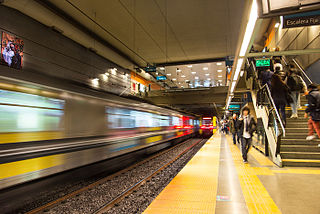
San José de Flores is a station on Line A of the Buenos Aires Underground. The station connects with Flores station on the Sarmiento Line commuter rail service. The station was opened on 27 September 2013 as part of the extension of the line from Carabobo to San Pedrito.

Alberti is a station on Line A of the Buenos Aires Underground. The station belonged to the inaugural section of the Buenos Aires Underground opened on 1 December 1913, which linked the stations Plaza Miserere and Plaza de Mayo. Like the Pasco station, it is one of two stations of the line which only has one platform, in this case only serving passengers heading towards San Pedrito. The other platform is located just a few meters away, but was closed in 1953 since the proximity of Pasco station meant having so many stops in such quick succession slowed the line's frequency.

Córdoba Station is a station on Line H of the Buenos Aires Underground, opened in 2015. It is located in the junction of Córdoba and Pueyrredón Avenues, in the limit with Balvanera and Recoleta neighborhoods. It is near to the University of Buenos Aires faculties of Economics, Pharmacy and Medicine. The station was opened on 18 December 2015 as part of the extension of the line from Corrientes to Las Heras.

The Al Ahmad Mosque is an Islamic place of worship in Buenos Aires, Argentina, opened in 1986. It is the second oldest mosque in Buenos Aires but it is the oldest building with Islamic architecture in Argentina and it was designed by Ahmed and Elia Ham.




















